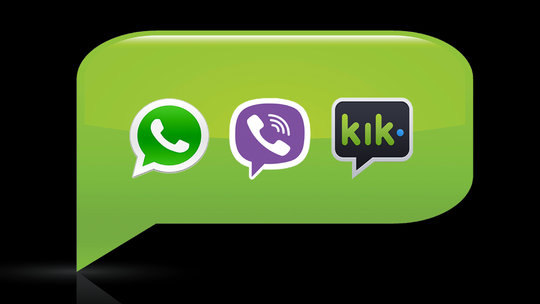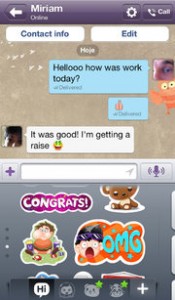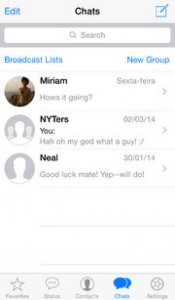
http://www.nytimes.com/2014/03/27/technology/personaltech/messaging-services-bypass-the-old-sms-route.html. By Dallas Jensen on Publish Date March 25, 2014.
By Kit Eaton
New York Times
“Kik me!” is not a silly note to pin to someone’s back. It’s a request to use the Kik app to chat with someone through mobile instant messaging. Kik is just one of many messaging apps that have arrived recently to rival the humble SMS as a way of rapid text communication from phones. If you haven’t tried any, you may be missing out.
Of all the SMS alternative apps, WhatsApp, recently acquired by Facebook for $16 billion, is perhaps best known. It is free for the first year and then costs $1 a year after that, in addition to any mobile data fees from the cellphone provider. It allows users to share chat messages that are longer than the odd 160-character limit of SMS messages; also, photos, videos, links and so on can be included inside chats. Chat messages can go to users all over the world no matter where they are, as long as they are also members.
Like previous forms of text messaging, WhatsApp is tied to a phone number. When you turn it on for the first time, it will scan through your contacts to see if any of your friends’ numbers are already signed up. You can then start or answer chats by tapping on a speech bubble icon.
Each chat is displayed in order by time, with color coding to indicate whether a particular message was sent by you or the recipient. A check mark appears when a message has been delivered and read.
But WhatsApp has features that make it slightly more clever than an SMS system. For example, it lets you set a “status” flag so contacts can know if you are available to chat or are busy. With a tap of a button you can also add a photo, video, your location data or even a particular contact’s information. Other extras include the ability to set the wallpaper behind each chat, or the option to “broadcast” chat messages to more than one person for group chats.
There is little to dislike about WhatsApp except that sometimes its interface design feels a little 1990s. It is available free on iOS, Android, Windows Phone and BlackBerry.
Kik is similar to WhatsApp. It does not require a phone number, because this chat app identifies you with a user name, but entering your number may help other users find you more easily. Chatting in Kik works like chatting in WhatsApp, including the way it shows messages inside chats, which Kik calls “conversations”: listed by time, with alerts for successful delivery and read receipts. Kik users can also share photos, videos and so on.
But Kik is as much about communicating with other Kik users across the world as it is about communicating with your friends. The app feels more playful, and it has a browser built in so you can quickly surf to a website, or perhaps a YouTube video, then chat about what you find. The app aims to appeal to a more youthful audience, but how you use it is up to you and your contacts.
It’s free on iOS, Android, Windows Phone and BlackBerry.
Viber, also free on iOS, Android, BlackBerry and Windows Phone, is an alternative messaging app that has one big extra feature: the ability to place free digital voice calls that do not eat up cellphone minutes, though they consume mobile data if you’re not on a Wi-Fi network.
The interface is clean and straightforward, and the app has extras like a selection of colorful digital “stickers” that can brighten up your text messages. Some stickers are included free, and others are available for a typical fee of $2 through an in-app purchase. I’m fond of this app, and use it to chat with several friends, but I wish sometimes that its interface were a bit more exciting.
Skype has long had a text-based messaging system alongside its more famous digital phone call system. The messaging part works reliably well, and in its favor is the fact that many millions of people already use Skype. This means the odds are that someone with whom you may want to chat is already using Skype. But the app’s interface feels clunky and less full-featured compared with the new competition, and it is overdue for an update with new features. Skype is free on Windows Phone, iPhone, Android and BlackBerry.
Lastly there is always Facebook Messenger, which works either inside the main Facebook app or as a stand-alone service. Like Skype, Facebook is already used by many people. But Facebook Messenger is my least favorite SMS alternative, mainly because of the awkward interface. At least it’s free.
Quick Calls
Klutch is a new iOS app that is about organizing real-life get-togethers. The app’s group chat and schedule features make it easy for friends to plan events and parties; users can even vote on their favorite options for meals and so on. It’s free.



